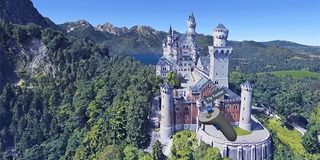Google Earth Virtual Reality Will Take You to Any Address in the World

A new Google Earth Virtual Reality (VR) feature allows users to enter any address — whether it's grandma's house or a 19th-century castle in Germany — and fly over it in 3D with a VR headset.
When Google Earth VR debuted, people could virtually visit a number of popular tourist destinations, including the Hoover Dam in Nevada and the Matterhorn in Switzerland. They could even gaze at the nooks and crannies of the Colosseum in Rome, an archaeological marvel.
But now, people can choose their own destinations, as long as they know the address or name of the location. [25 Strangest Sights on Google Earth]
"People want to quickly find and revisit the places that mean the most to them, whether it's a childhood home or favorite vacation spot," Joanna Kim, a product manager at Google Earth VR, wrote in a blog post today (April 18). Now, users can type an address or the name of a location, and visit it in 3D with a 3D headset system, Kim wrote.
Sightseers can also visit 27 handpicked locations that are now available on Google Earth VR, including Neuschwanstein Castle (the inspiration for the castle in Disney's "Sleeping Beauty"), Table Mountain in South Africa and the Perito Moreno Glacier (Glaciar Perito Moreno) in Argentina.
Google Earth VR is now available for Oculus Rift users who have Oculus Touch controllers. The application is free at the Oculus Store and Steam.
Previous 3D maps created by Google Earth include street views of the Amazon rainforest; the 18,192-foot-high (5,545 meters) high Mount Everest base camp; and Rio de Janeiro, the city that hosted the 2016 Summer Olympics.
Sign up for the Live Science daily newsletter now
Get the world’s most fascinating discoveries delivered straight to your inbox.
Original article on Live Science.

Laura is the archaeology and Life's Little Mysteries editor at Live Science. She also reports on general science, including paleontology. Her work has appeared in The New York Times, Scholastic, Popular Science and Spectrum, a site on autism research. She has won multiple awards from the Society of Professional Journalists and the Washington Newspaper Publishers Association for her reporting at a weekly newspaper near Seattle. Laura holds a bachelor's degree in English literature and psychology from Washington University in St. Louis and a master's degree in science writing from NYU.
Most Popular



